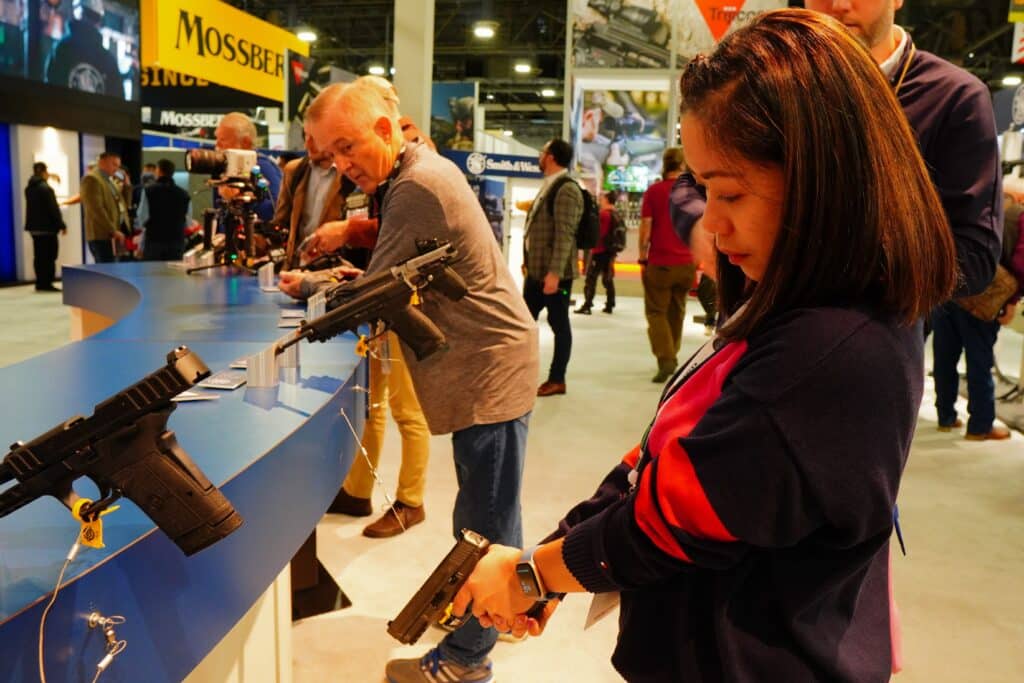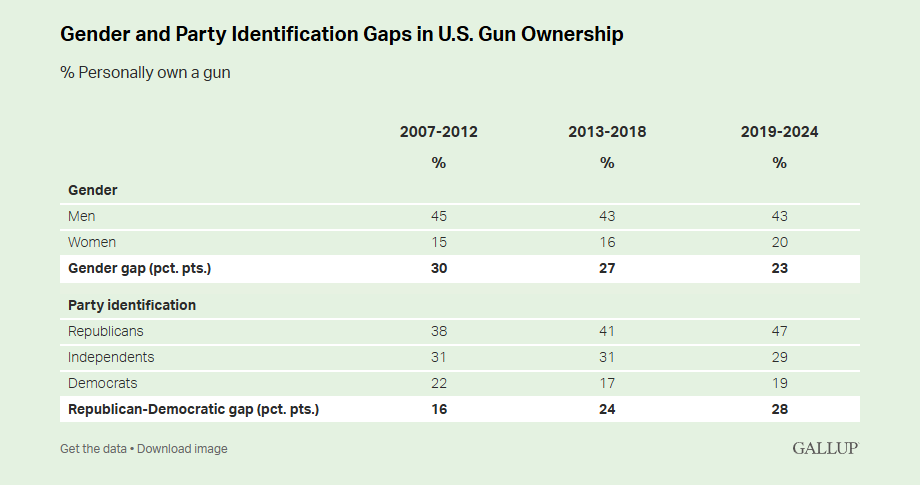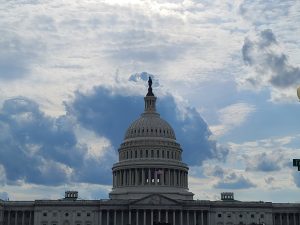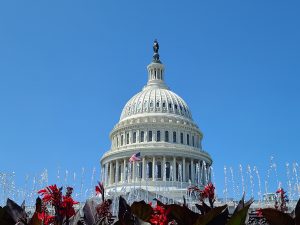Decades ago, gun-rights activists managed to enact preemption laws throughout most of the country that ensured local gun restrictions would not exceed those imposed by the state. Since then, gun-control activists have tried to pierce those protections. Philadelphia, Pennsylvania has served as a staging ground to develop new attacks on preemption for just as long.
This week, the latest attempt cooked up by the city of brotherly love was rejected by the state’s supreme court. Contributing Writer Jake Fogleman explains why it probably won’t pop up elsewhere but why it probably won’t end the preemption fight either.
Then, I take a look at the latest polling from Gallup. On the surface, gun ownership looks steady. But the data reveals a lot of movement in the gender and partisan makeup of gun owners.
Plus, Semafor’s Dave Weigel is back on the show to assess the outcome of the 2024 election. And we’re doing a Q&A podcast next. So, send in your questions!

Analysis: Philadelphia Gun Fight Sets Back, Doesn’t End Preemption Battle [Member Exclusive]
By Jake Fogleman
Pennsylvania’s Supreme Court staved off a novel new attack on state preemption laws this week. That’s a setback for gun-control activists nationwide, but it won’t be the end of the fight–even in the city that launched the latest offensive.
In a unanimous 6-0 decision, the heavily Democratic court rejected a lawsuit from Philadelphia that argued the state’s roughly 50-year-old statutory scheme prohibiting local governments from passing their own gun regulations is unconstitutional. The city argued that the state Constitution implicitly granted local officials the right to pass strict gun laws, but that interpretation didn’t persuade a single member of the court.
“Here, Appellants seek an interpretation of Article I, Section 1 of the Pennsylvania Constitution that would designate the individual right to ‘defend life and liberty’ not just as a collective right, but as a collective right to self-defense from private acts of gun violence, specifically by means of local legislation,” Justice Kevin Brobson, one the court’s two Republicans, wrote. “Simply put, Appellants provide no basis upon which to conclude that the right to ‘defend life and liberty’ set forth in Article I, Section 1 is so broad as to encompass such a right.”
Gun-control activists and city officials in red-leaning states have long had an antagonistic relationship with state preemption laws. Yet, the Philadelphia suit marked the first time any tried to have them stricken as unconstitutional. Often, these novel lawsuits serve as trial balloons that, if successful, become templates for gun-control groups to use when seeking success elsewhere. After all, Pennsylvania is only one of more than 40 states with similar prohibitions on local gun control.
That’s why, even though the city and a local gun-control group initiated the Philadelphia case, it had the attention and support of several national groups, including Giffords and Brady.
That the courts soundly rejected the idea in the first locality gun-control advocates attempted it likely reduces the odds of further attempts in other states. However, it probably won’t change much about Philadelphia’s appetite for fighting the state for stricter gun regulations. Already, city officials have pledged to remain resolute in the face of legal defeat.
“The Parker administration will continue to seek remedies to Philadelphia’s deadly gun violence crisis through every legal tool in the toolbox at our disposal,” Ava Schwemler, a spokesperson for the city’s law department, told The Reload after the decision came down.
Philadelphia will almost certainly continue to pass new gun restrictions. After all, that has been the city’s go-to playbook for decades.
In 1993, the city passed an “assault weapon” ban. In 1996, the Pennsylvania Supreme Court struck it down under preemption in Ortiz v. Commonwealth. In 2007, the city passed another assault weapon ban alongside six other gun-control measures ranging from special licensing for gun ownership to an ammunition registry. In 2008, Pennsylvania courts stuck down those measures in Clarke v. House of Representatives. As recently as 2022, a state judge blocked the city’s attempt to create new gun-free zones.
So, the city and its elected officials embraced defiance against state preemption long before last Wednesday’s ruling. They even scored a rare court victory in the fight earlier this year.
In February, the Commonwealth Court of Pennsylvania upheld a 2021 Philadelphia ordinance outlawing the possession, use, transfer, or manufacture of homemade guns and gun parts. The majority reasoned that even though Pennsylvania law preempts local gun restrictions, unfinished gun parts are not actually firearms, and therefore, the city can regulate them.
Finally, the lack of significant consequences for Philadelphia’s continued defiance makes it all the more likely to continue.
Elsewhere, states fed up with localities flouting state preemption have begun passing “enhanced” preemption laws designed to extract civil damages from local governments when their restrictive ordinances lose in court. Pennsylvania lawmakers tried the same thing in 2022, but then-Governor Tom Wolf (D.) vetoed it. Since then, Democrats have retained the Governor’s seat and gained a majority in the state House, making another effort to bolster preemption unlikely.
Furthermore, Philadelphia elected officials have little concern about facing a political cost for their continued resistance. In the deep blue city, regularly warring with the more conservative state government and gun-rights groups over attempts to pass strict gun laws is a boon, not a drag, for the city’s leaders.
Still, the court decision takes an extremely expansive reading of how much power local officials have to restrict firearms. That’s something gun-rights advocates are certainly happy about.
“The underlying legal theories pressed in the Pennsylvania Supreme Court were radical,” Robert Leider, a George Mason University law professor and Second Amendment scholar, said of the ruling. “These theories were premised on the state legislature having a positive constitutional obligation to enact rigorous regulatory laws—constitutionally entrenching progressive government.”
But Philadelphia will probably go on disregarding preemption, passing its own gun laws, and forcing gun-rights groups to play whack-a-mole with individual lawsuits until stronger disincentives for doing so come along.
Podcast: Semafor’s Dave Weigel on What the Election Means for Guns [Member Early Access]
By Stephen Gutowski
This week, we’re looking back at the 2024 election and forward at the next administration.
To do that, we have Semafor’s Dave Weigel on the show. He joined us shortly before the election to discuss each campaign’s gun messaging. Now, he’s back to sort through what worked, what didn’t, and where things go from here.
Weigel agreed there probably wasn’t enough detailed evidence to suss out exactly how well each message performed. But he said the recent downturn in Democratic support for handgun bans is probably tied to Kamala Harris emphasizing her Glock ownership. However, the fact handgun bans are so unpopular to begin with probably underscores how much her history of backing such bans drug her campaign down.
He also looked ahead at the new GOP-controlled federal government. Weigel said Donald Trump may be more motivated to undo what Joe Biden has done rather than push new gun-rights reforms of his own. He also said Congress is unlikely to pass significant new legislation but will be able to confirm a lot of pro-gun judges–though, he noted the GOP majority may be more fragile than it appears at first glance.
You can listen to the show on your favorite podcasting app or by clicking here. Video of the episode is available on our YouTube channel. An auto-generated transcript of the episode is available here. Reload Members can listen on Sunday, as always. Everyone else can listen on Monday.
Plus, Contributing Writer Jake Fogleman and I break down new gun polling data from Gallup. We also unpack data showing a shrinking gender gap, but a widening partisan gap, among gun owners. Finally, we wrap up with a pair of significant gun-related state Supreme Court rulings out of Pennsylvania and Iowa dealing with state preemption and the ability to restrict gun rights for persons with a history of being involuntarily committed.
Q&A Podcast
Now that we’re far enough from the election to have a good idea of what happened and what’s coming next, it’s a good time to do another question-and-answer podcast. Since you’re a Reload Member, you get to ask the questions Jake and I answer.
So, what do you want to know? There’s a lot to digest, and I assume you guys have a lot of questions. Just reply to this email and ask away!

Analysis: Gun Ownership Gender Gap Shrinks as Partisan Gap Widens [Member Exclusive]
By Stephen Gutowski
Americans are now more likely to be divided by political party than gender when it comes to whether or not they own a gun.
Those are the findings of new polling Gallup released on Thursday. Republican women and Democratic men largely drove that shift. However, the movement resulted in a wash, with about the same number of Americans reporting they own a gun as they did over a decade ago.
“According to six-year groupings of Gallup’s annual measurement of personal gun ownership since 2007, the percentage of Republican women who own a gun has increased from 19% in 2007-2012 to 33% in 2019-2024,” Jeffrey Jones, who oversees Gallup research and analysis, said in a post about the polling. “Meanwhile, the rate has fallen seven percentage points among Democratic men, to 29%, and is down five points among independent men, to 39%.”
The results show American gun ownership trends have been remarkably stable but also reveal the shifting demographics under that calm surface. The poll’s increase in female gun owners matches those found in previous polling and industry research. Although, the decline in ownership among Democrats may be on pace to reverse if Gallup’s other recent polling is accurate. Democrats’ opposition to handgun bans dropped sharply in October, probably not coincidentally, as Kamala Harris put a heavy emphasis on her own handgun ownership.
But, if gun ownership does become an increasingly partisan phenomenon, it could put gun rights on a more precarious footing in the long term.
There is some reason to think Gallup’s numbers may not be fully representative, though. The overall gun ownership stagnation Gallup identified is at odds with some other indicators–especially in the wake of record gun sales during the pandemic. Polls from the Associated Press, the University of Chicago, and NBC News all identified gun ownership spikes post-2020.
Some of that dichotomy could stem from an increasing unwillingness of some Americans, especially minority women, to tell researchers they own guns. Last year, a study by the New Jersey Gun Violence Research Center at Rutgers University found reluctance to speak with pollsters or academics could impact the accuracy of gun ownership polling–and that impact could be significant.
“Bottom line of the study is that some gun owners aren’t comfortable disclosing firearm ownership in surveys. So, from a research perspective, we may not be fully capturing who owns firearms in the US,” Allison Bond, lead author of the study and a doctoral student at the center, told The Reload at the time. “That’s limiting our understanding of firearm ownership and also our ability to reach these individuals and provide them information on things like secure firearm storage methods.”
Still, it’s not clear if that’s a new effect or an underlying issue that’s impacted gun studies for a long time. Gallup’s research has also followed similar standards over the years and should be able to provide trend insights even if its topline numbers are more uncertain.
Gallup found that, while the gap between men and women gun owners had closed, men were still more than twice as likely to own guns.
“The model estimates that the statistical odds of a man owning a gun are 3.1 times greater than the odds of a woman owning a gun, after taking into account the effect of other variables,” Jones wrote. “That compares with a much larger 4.5′ odds ratio’ for men versus women when applying the same model to the 2007-2012 data.”
On the other hand, partisanship has taken on a more significant role in whether somebody owns a gun. Gallup said that even though party affiliation wasn’t a good predictor of gun ownership from 2007 through 2012, Republicans are now much more likely to own guns than non-Republicans, and the opposite is true of Democrats. Unsurprisingly, political ideology serves as a similar predictor, with conservatives much more likely to own guns than liberals.
Gallup identified several non-political factors that played a role in whether somebody owned a gun in 2024, too. Those who live in rural areas or the south, have a higher income, or are older were more likely to own guns than the average person.
Meanwhile, the pollster said some of the factors that used to separate gun owners from non-gun owners have faded over time.
“Race, marital status and education had been among the strongest predictors of gun ownership in the 2007-2012 data, but those factors are less influential today as political party, ideology and income have grown in importance,” Jones wrote.
Gallup said rural men were the most likely to own guns, at 67 percent, among those surveyed. Women between the ages of 18 and 29 were the least likely to own guns, at just nine percent.
Overall, the pollster said about a third of Americans report they personally own a gun, and 44 percent said there is a gun in their home. That’s in line with previous polling, but the makeup of American gun owners has shifted significantly over the years.
“A steady 31% of U.S. adults personally own a gun, while another 13% say there is a gun in their household that belongs to someone else,” Jones wrote. “The stability in the overall figures obscures an increase in ownership among women in general, driven by Republican women. At the same time, fewer Democratic and independent men own guns, suggesting that gun ownership decisions may be influenced by one’s political beliefs more than in the past, likely because of the salience of the gun issue in political campaigns and political culture today.”
The closing of the gender gap on guns could bring Americans’ views on gun policy more in line, but not if gun owners increasingly sorting along party lines.
If Democrats increasingly abandon gun ownership and, in turn, become increasingly hostile to the idea at the same moment Republicans increasingly embrace it, that could result in an even more severe seesawing of American gun laws depending on who has control of the local, state, and federal levers of government at any given time. That’s certainly something that’s already played out to a noticeable degree, especially in deep red and blue states where gun policy diverges significantly. But it’s a dynamic that could intensify the more polarized gun ownership becomes.
That’s it for now.
I’ll talk to you all again soon.
Thanks,
Stephen Gutowski
Founder
The Reload








